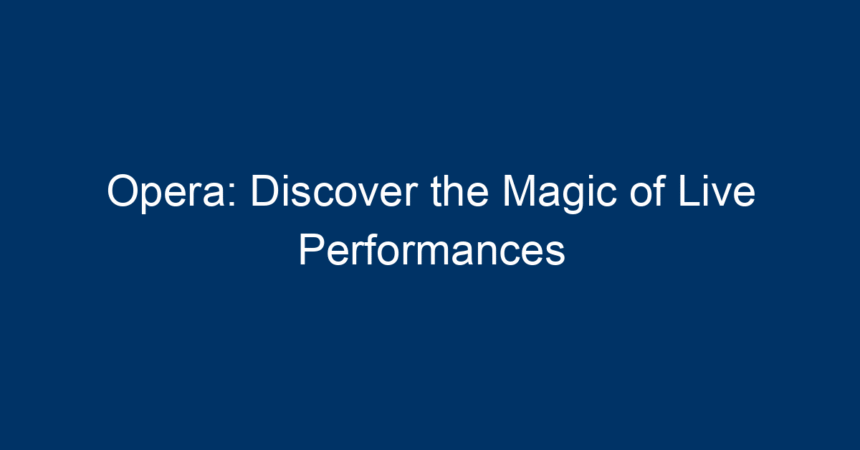Opera is a breathtaking art form that combines music, drama, and visual spectacle to create unforgettable experiences. Originating in the late 16th century, opera has since evolved into a genre that captivates audiences worldwide. In this article, we will explore the enchanting world of live opera performances, including its history, the elements that make it unique, and practical tips for enjoying this remarkable art form.
The History of Opera
The Origins of Opera
The roots of opera trace back to Italy, with the first performances occurring in Florence during the late Renaissance. These early operas were influenced by Greek theatre and aimed to revive classical ideals. "Dafne," composed by Jacopo Peri in 1598, is considered the first opera, setting the stage for the flourishing of this art form.
Evolution Through the Ages
As opera developed, various styles emerged. The Baroque period (1600-1750) saw the rise of renowned composers like Handel and Monteverdi, whose works still resonate today. The 19th century brought Romanticism, with composers such as Verdi and Wagner pushing the boundaries of emotional expression. Modern opera continues to thrive, showcasing contemporary themes and diverse musical influences.
The Elements of Opera
A Multi-Sensory Experience
Opera is distinct from other forms of theatre due to its blend of various artistic elements. These include:
-
Music: The backbone of any opera, music conveys emotion and drives the narrative forward. Composers use orchestration, vocal styles, and harmonies to evoke feelings that words alone cannot express.
-
Libretto: The literary component of an opera, the libretto is the text that tells the story. Written in various languages, it can range from tragic dramas to light-hearted comedies.
-
Staging and Set Design: Visual elements like sets, costumes, and lighting create the backdrop for the performance. These aspects play a crucial role in immersing the audience in the opera’s world.
- Performers: Great opera singers not only possess exceptional vocal talent but must also be skilled actors. The chemistry between the cast and the emotions they portray is vital to the overall experience.
The Role of Conductors and Orchestras
A conductor is essential to a successful opera performance. They guide the orchestra, coordinating the timing of the music with the singers’ performances. The richness of the orchestral score adds depth to the vocals, enhancing the operatic experience.
The Impact of Live Opera Performances
Cultural Significance
Opera plays a significant role in cultural expression. It reflects societal values, historical contexts, and emotional truths. Through its storytelling, opera offers a window into diverse cultures and experiences.
Building Community
Watching opera together fosters a sense of community among audience members. Opera houses are often grand venues, enhancing the experience of being part of something larger than oneself. Many communities host opera festivals, making this art form accessible to a broader audience and strengthening social ties.
How to Enjoy Live Opera Performances
Choosing the Right Opera
With an array of operas available, it’s essential to choose one that aligns with your interests. Here are a few popular operas to consider:
-
La Traviata by Giuseppe Verdi: A poignant tale of love and sacrifice, perfect for those who appreciate emotional depth.
-
The Magic Flute by Wolfgang Amadeus Mozart: A whimsical opera that blends fantasy with humor, appealing to families.
- Carmen by Georges Bizet: A passionate story of love and betrayal, offering a dynamic mix of music and drama.
Tips for Attending an Opera
-
Research the Opera: Familiarize yourself with the plot and characters beforehand. Understanding the story can enhance your experience and help you appreciate the nuances of the performance.
-
Choose Your Venue Wisely: Different opera houses offer unique atmospheres. Whether it’s a grand historical opera house or a more intimate space, select a venue that suits your vibe.
-
Dress Appropriately: While some opera houses have a formal dress code, others may be more relaxed. Check the venue’s guidelines and dress accordingly to feel comfortable.
-
Arrive on Time: Punctuality is crucial in the opera world. Arriving late can disrupt both your experience and that of others. Aim to arrive at least 30 minutes early to find your seat and soak in the ambiance.
- Engage with the Experience: Allow yourself to be swept away by the music, story, and visuals. Turn off distractions, and immerse yourself in the performance.
Post-Performance Reflection
After the show, take time to discuss the performance with fellow attendees or reflect on your own feelings. Sharing thoughts can deepen your understanding and appreciation of the art form.
The Accessibility of Opera Today
Online Streaming and Digital Platforms
In recent years, many opera companies have embraced digital technology, offering live-streamed performances and recorded operas for at-home viewing. This shift has democratized access to opera, enabling more people to enjoy it regardless of their location.
Community Programs and Outreach
Many opera companies actively seek to engage the community through educational programs, workshops, and outreach initiatives. These efforts aim to foster a love for opera among younger generations and broaden the audience base.
Conclusion: Embrace the Magic of Opera
Opera is not just a performance; it’s an experience that combines music, drama, and visual art to form a tapestry of emotions and storytelling. Whether you are a lifelong fan or a newcomer, exploring the world of live opera can enrich your cultural appreciation and create lasting memories.
Actionable Insights
-
Attend an Opera: Look for performances in your area or explore streaming options to experience the magic of live opera.
-
Educate Yourself: Read about different operas, composers, and historical contexts to deepen your appreciation.
- Share Your Experiences: Discuss opera with friends and family, and encourage them to join you in discovering this captivating art form.
By embracing the magic of opera, you not only enrich your own life but also contribute to the preservation and evolution of this timeless art form. Explore, enjoy, and let opera take you on a journey through music and emotion.




